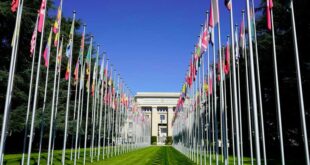Joshua Yaffa
n the matter of a few hours on Monday, Russia lost more than a hundred of its diplomats in the United States and Europe—the result of coördinated expulsions in response to the poisoning, in March, of a former spy, Sergei Skripal, and his daughter, Yulia, in the United Kingdom. The Trump Administration will expel sixty Russian diplomatic staff from the U.S., including from Russia’s mission to the United Nations; it will also close the Russian consulate in Seattle.
The fact that several dozen Russian diplomats will be sent packing is not in and of itself a great loss for the Kremlin. Such expulsions, which were a regular feature of the Cold War, have taken on the air of ritualized formality, and represent more symbol than substance. The loss of Russian personnel may inflict some short-term costs on Russian intelligence gathering, but it’s far from a top-to-bottom roundup.
More important is that Washington and fourteen European Union countries announced the measures as a single, unified policy decision. Over the last several years, the Kremlin’s overarching goal has been to split alliances and weaken institutions in the West, hoping that Russia can fracture or otherwise prove feckless multilateral bodies such as the E.U. and nato. As part of those aims, it would also like to weaken diplomatic and security coöperation between the United States and Europe. That is why the Kremlin welcomed Brexit, and why it was, at least initially, buoyed by the election of Donald Trump, a candidate who was hostile to exactly the sort of alliances and multilateral bodies that the Kremlin itself wanted to upend. Putin wants to deal with states individually, old-school Realpolitik style, thinking—perhaps correctly—that he can play a stronger hand one-on-one, rather than facing a united front.
The symbolism, then, comes from the synchronization of the expulsions—it is that fact, more than the difficulty of losing this or that diplomat abroad, that will register in Moscow. It was not entirely obvious that the United Kingdom would be able to successfully negotiate a coördinated policy response with a body, the European Union, that it is in the process of leaving; nor that the Trump Administration, marked by its capriciousness and penchant for isolationism, led by a President with a demonstrated affinity for Putin, could be persuaded to join in. The fact that U.S. and European officials were able to pull off this small feat of multilateral diplomacy suggests the notion of Western security coöperation may yet have some steam left in it. In calling the expulsions a “provocative gesture of solidarity,” the Russian Foreign Ministry was perhaps accidentally a bit too honest in revealing what Moscow finds most troubling in the move.
But it is also telling that, although many E.U. governments moved to expel Russian diplomats from their territory, almost half did not—exactly the sort of intra-E.U. split that the Kremlin has been hoping for and trying to foster for years. Last week, Alexis Tsipras, the Prime Minister of Greece—which is not expelling any diplomats—gave a squishy position on the Skripal poisoning, offering his country’s “solidarity” with the United Kingdom, but remained noncommittal on countermeasures, saying, “We need to investigate.” On Monday, the center-right Austrian government, led by a party with long-standing ties to Russia, also declined to join the expulsions. Chancellor Sebastian Kurz has said that the nation wants to serve as a “bridge-builder between East and West.” These policy differences are a thread on which the Kremlin will continue to pull, and now it knows exactly where the seams are.
Monday’s expulsions are yet another data point in a growing, rather paradoxical reality, in which Trump as an individual continues to act glaringly conciliatory to Putin, yet his Administration repeatedly takes measures that are arguably more hostile to Putin than those enacted under Obama. It was the Trump Administration, for example, that approved the sale of anti-tank Javelin missile systems to Ukraine, earlier this month—a weapons transfer that is anathema to Putin, and one the Obama Administration did not authorize. And in December, 2016, Obama, in response to Russia’s election meddling, expelled thirty-five Russian diplomats, almost half the number named by Trump on Monday.
Moscow has surely noticed that Trump can’t bring himself to say a bad word about Putin; but it is no less glaring that his Administration proves, over and over again, to be quite hawkish in its Russia policy. Whether out of hope-dies-last faith or because they know something we don’t, Russian officials continue to try and separate Trump from just about everyone else in Washington, holding on to the idea that Trump is being forced to lash out against Russia by others in government. On Monday, a Russian senator from the Foreign Affairs Committee said that Trump authorized the expulsions only “under the strongest pressure from the American establishment.” At this point, what else can Russian officials say? It’s not clear they have a policy Plan B for dealing with Trump other than to hope that, like U.S.-European relations or nato, the President and the foreign-policy apparatus in Washington is an institutional relationship that can be split apart.
Russia will surely enact reciprocal measures, expelling a comparable number of U.S. and European diplomats. It will likely close a U.S. consulate somewhere in the country. (The Twitter account belonging to the Russian Embassy in Washington asked followers to vote for which U.S. consulate should be closed: St. Petersburg, Vladivostok, or Yekaterinburg.) These impending losses to the U.S. diplomatic corps will complicate the work of the Embassy in Moscow, which lost seven hundred and fifty-five foreign service officers and support staff in the last round of tit-for-tat expulsions, in July. More unpredictable and asymmetric responses are also possible; after the United Kingdom expelled twenty-three Russian diplomats earlier this month, not only did the Kremlin respond in kind but it ordered the closure of the British Council, a U.K.-run cultural institution that funded popular exhibits, performances, and festivals throughout Russia.
Ultimately, diplomatic expulsions are the easy and obvious policy solution. They don’t force London and other European financial centers to confront uncomfortable truths about the amount of Russian money sloshing through their financial institutions and real-estate markets. The United Kingdom, especially, is sensitive to the loss of international capital at a time when its status as a global financial hub is already in question because of Brexit.
That leaves demonstrative measures like Monday’s expulsions—the Kremlin won’t like them, but it can certainly live with them. It will easily be able to portray them as part of the West’s ingrained Russophobia. After Putin’s essentially uncontested reëlection last week, his campaign spokesman, Andrey Kondrashov, explicitly addressed how Putin benefitted from tensions with the United Kingdom over Skripal. “We must say thanks to Great Britain,” Kondrashov said, explaining how the Kremlin met its seventy-per-cent target for voter turnout. “We were pressured exactly at the moment when we needed to mobilize,” he said, adding that, when Russia is accused of something on the world stage, “the Russian people unite around the center of power. And the center of power is certainly Putin.”
But the Russian public has little sympathy for the oligarchs and corrupt officials who park their money in the West, and going after them would meet with sympathy—even outright support—inside Russia itself. Imagine the difficulty for Russia’s television propagandists in spinning to viewers why they should be outraged that a bureaucrat lost access to his apartment in London or villa in the South of France. Yet that would carry a real, not just theatrical cost, for the governments carrying out such measures. In other words, a U.S. or E.U. crackdown on illicit cash and investments coming from Russia would be a truly significant sanction, not just for those on the receiving end but for those enacting it—which is exactly the reason it’s not happening.
First published at the New Yorker
 Geostrategic Media Political Commentary, Analysis, Security, Defense
Geostrategic Media Political Commentary, Analysis, Security, Defense





